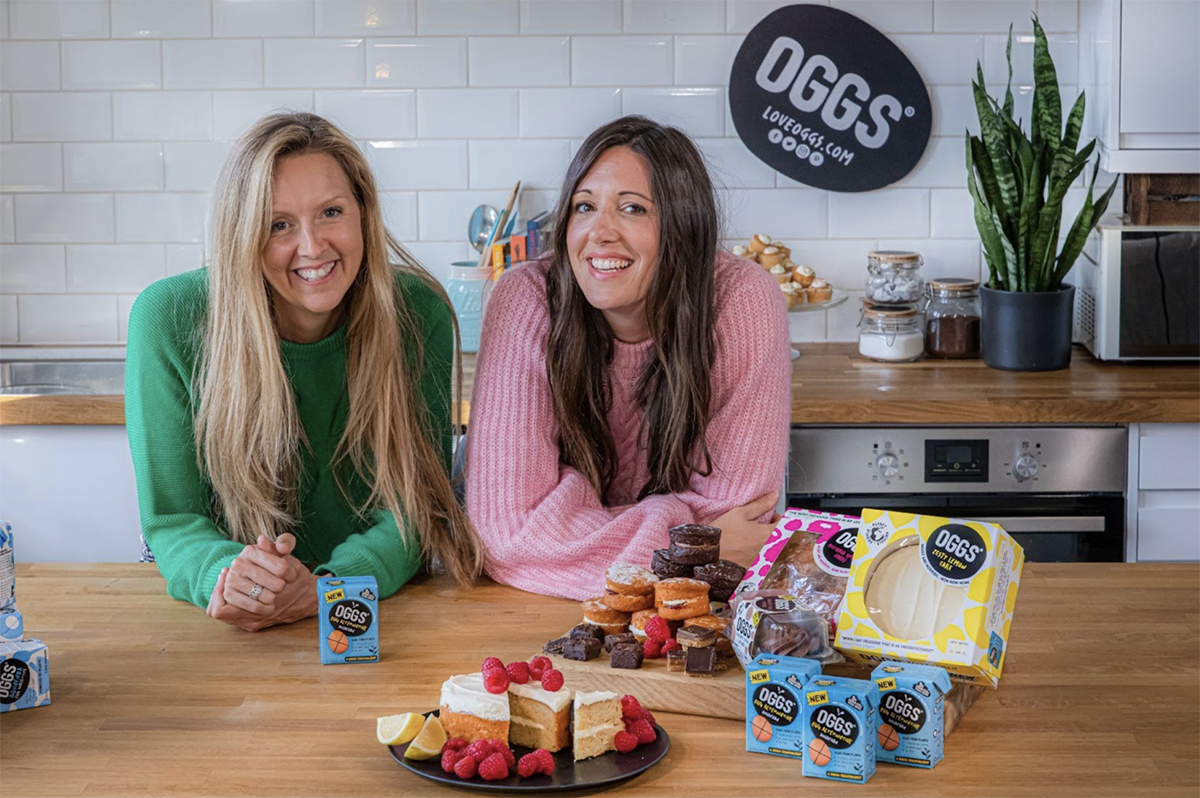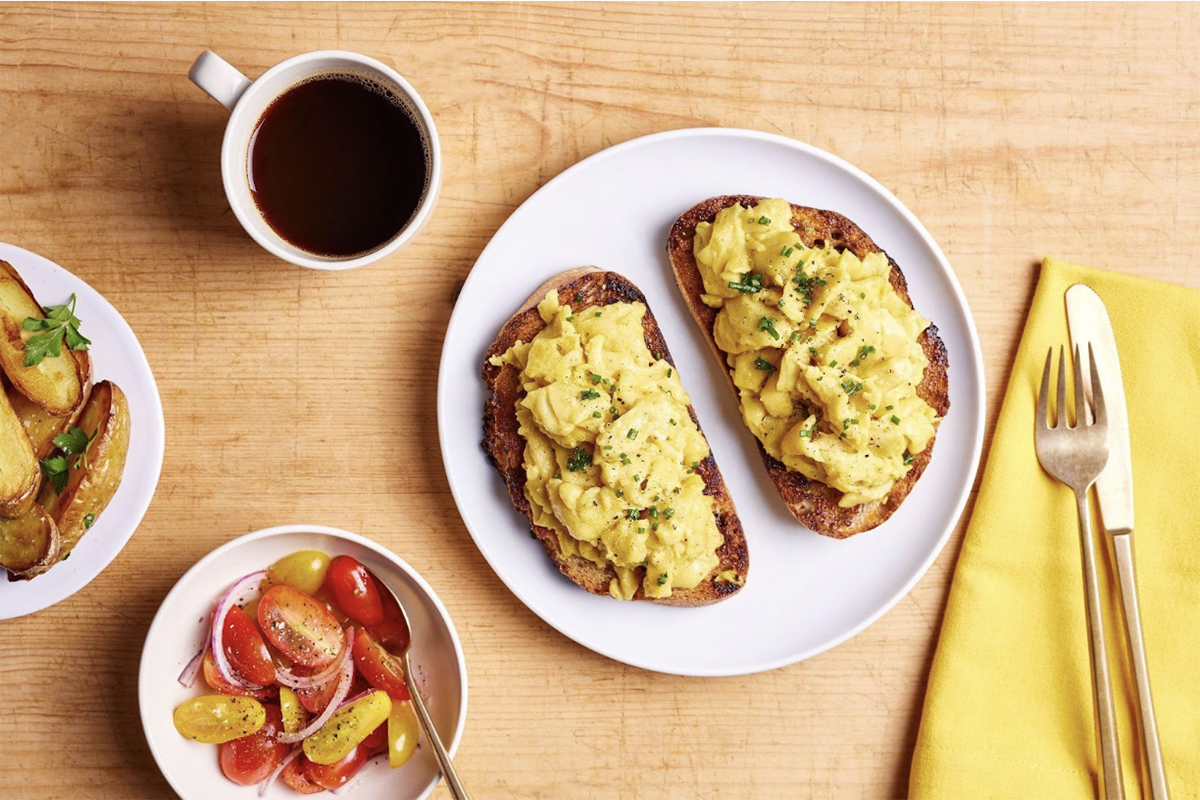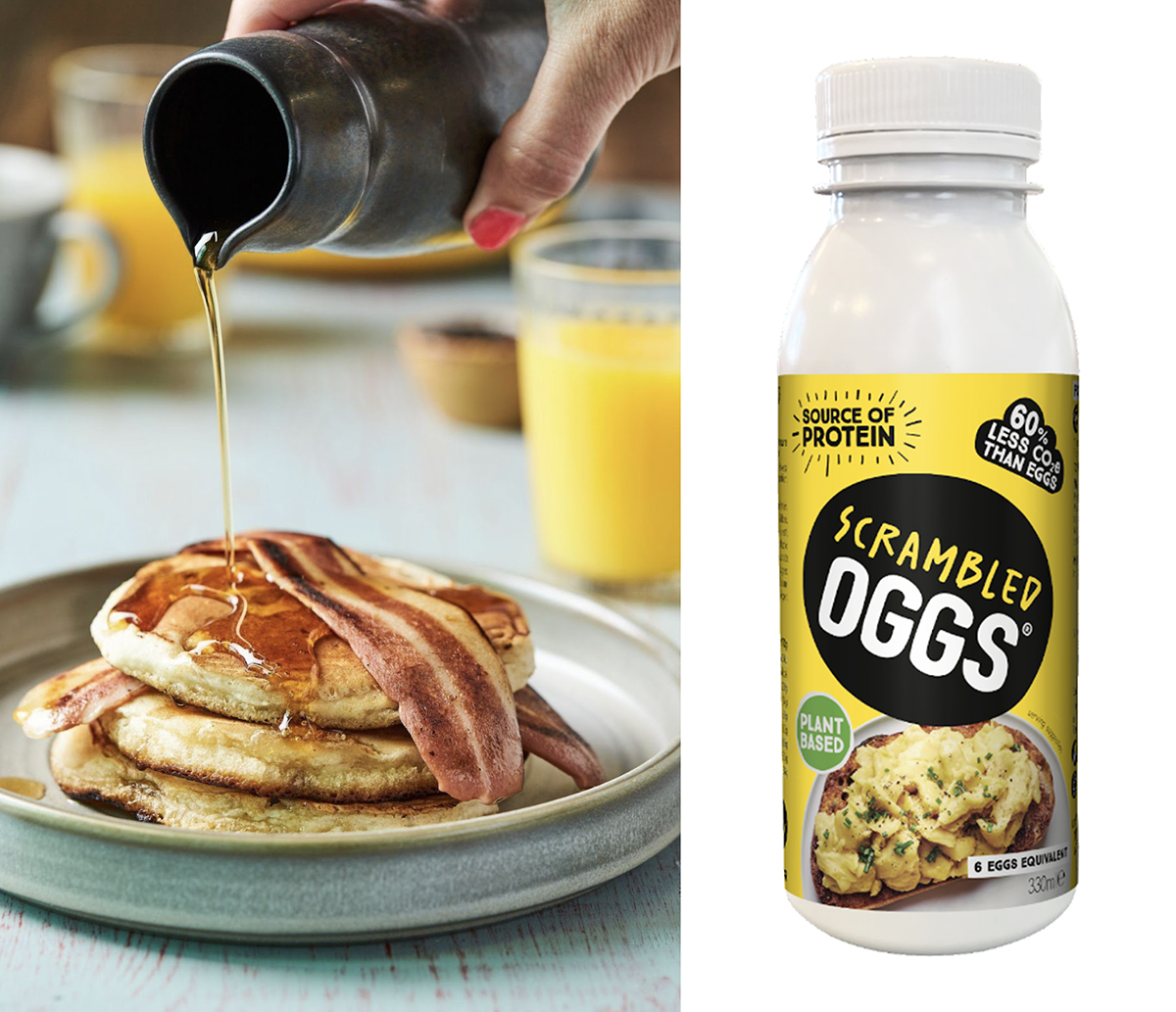August 24, 2022
Using the power of cake to remove eggs from the food chain, OGGS®, a vegan bakery firm and alternative egg producer, is spearheading the alternative egg revolution in the UK.


Co-founders Polly Trollope (left) and Hannah Carter (Right)
In the UK, over 13 billion eggs are consumed each year. Many of the hens that produce these eggs are crammed into small cages, debeaked, and subjected to a life of misery. Hens in the wild produce around 10 to 15 eggs annually while in modern farms, this figure stands at between 250 to 300 eggs a year as a result of intensive breeding, high-protein feed and artificial light. Meanwhile male chicks, deemed ‘worthless’ by the industry are slaughtered in their millions each year, amounting to as many as seven billion chicks globally. UK egg production is also responsible for a huge amount of carbon emissions, as well as soil and water contamination.
Launched by vegans Hannah Carter and Polly Trollope out of a desire to remove eggs from the food chain, OGGS® is the UK’s top-selling vegan bakery and egg alternative brand. Since launching in 2019, they have prevented the use of over one million eggs: a reduction of over 226 tonnes of CO2e, which, according to the company, is the equivalent of driving around the world 51 times.
At OGGS®, the magic ingredient is aquafaba: a liquid made from chickpeas. Its viscous consistency makes it a perfect plant-based substitute for both whole egg and egg whites in cooking. Using this amazing liquid, OGGS® has created a range of vegan cakes and sweet treats that are delicious but also kind to the environment. They have also developed a scrambled egg substitute made from chickpea protein. Madaline Dunn caught up with Polly Trollope to find out more about the company.
There are a lot of unnecessary eggs used in the food chain that are simply there to provide structure and functionality, not taste. Take brownies for instance – people don't buy them because they've got eggs in them, they buy them because they taste great. We recognized that if you could remove eggs and replace them with plants, you could reduce the cruelty experienced by chickens and also massively reduce the pressure placed on the planet, without compromising the quality of the product. Thirteen and a half billion eggs are eaten each year in the UK alone. That's a mind-blowing amount – nearly 40 million a day! It causes so much suffering and contributes so much strain on the planet.
Hannah and I are both vegan and really wanted to do something more than what we could achieve individually. While our motivations were philanthropic, we also absolutely love cake and thought, "If we're going to be vegan, we still need to have cake in our lives." But, when we were looking at how to veganize our favorite baked goods, it was actually really difficult. Eggs can do loads of different things: emulsify, bind, fluff, etc, which makes them very difficult to replicate with plant-based ingredients.
Once we came across aquafaba, we saw that when it worked it worked really well, but it wasn’t consistent. We wanted to develop a recipe that would work every time and we realized if we could scale it, then we could fundamentally change the way people eat, without compromising on taste or texture. We spent a long time figuring out how to scale it and make it work every time.

When we started, neither of us were experts in food. So we set to work with two university partners to really dive into the detail of the optimum composition and production methodologies for maximizing the effectiveness of this magic bean water that is aquafaba - and it was a lot harder than we thought!
It took a couple of years to discover the optimal formula because we wanted it to be functional but also have a neutral taste. Luckily, we didn't give up - we pushed through the hard times, and we have a UK patent for the work that we've done. Although aquafaba has been around for years, no one before us had really looked at what makes aquafaba great and what you need in it to replicate an egg well. We now have a second patent pending and extensions in the US and the EU.
Whilst the basis of the products is similar with both using chickpeas, the process was very different. We've robustly tested our aquafaba against egg white and found that it actually outperforms egg and is better than the original, which we're proud of and slightly surprised by! However people were asking, "Can we scramble it?" and as a product, it's not really meant for that.
Rather than replicating egg in its taste and texture, it's meant to be a functional ingredient that’s good for foaming and emulsification, so ideal for baking or as a foam for cocktails, but we really wanted to make sure that people didn't have to miss out on having eggs in their breakfasts, brunches or even egg (OGG!) fried rice!
Our Scrambled OGGS® looks and cooks just like egg and, while you can use it to scramble, you can also use it in quiches and omelets. There was an incredibly innovative and complex process that went into developing the product and we drew in experts to help us. It's got the benefit of reducing CO2e by over 60% while still being a source of protein, which is a bonus, especially for people with a vegan diet. Ultimately our driver is to create products that leave you thinking, "Well, why wouldn't I have this instead? It’s just as good as the real thing!"
I think in general, plant-based food is becoming more integrated into people's diets and consumers have expanded their expectations beyond what's already available. We produced the first plant-based range of bakery goods available in the UK market, and now that's also exploded. Before us, it was almost as if people thought that vegans didn't like to eat sweet things because there was just nothing available! It was all plant-based meat and milks. We were actually named in the 2020 Mintel report as the reason that the plant-based bakery category has been unlocked; our aquafaba allowed that transition to happen.
I also think it's taken longer because developing this kind of product is so difficult. It’s been challenging to replicate that complex structure and functionality that an egg provides because it's so versatile.
So now we're seeing a lot of companies turning their attention to these untapped opportunities because the meat and milk alternative markets are becoming relatively saturated. People are looking at egg and fish as the biggest growth areas, but they are challenging, and we're one of the companies driving it forward and showing that it is possible. It's such an exciting sector to be in and there's some incredible development going on around the world alongside ours, which we're thrilled about. We just want to help make sure that people don't need to eat as many eggs, and so however we can do that, we'll give it a go.

We're an incredibly mission-driven business and everything ultimately comes down to "is this going to save as many eggs as possible?". So, our drivers are: "Does it taste as good or better than its non-vegan counterpart?" and "How can we get it out to as many people as possible?". We're doing that through restaurants and supermarket shelves, which is the best way to do it if we want to have a significant impact.
We understand that not everyone will choose to be vegan, but we know there are a lot of people who are wanting to make small contributions and changes in their lives to benefit the planet. That's why we make these plant-based egg alternatives and sweet treats - they taste as good as you've always known them, and through them you can create opportunities for people to make positive changes in everyday moments.
As I mentioned, the first big question for us is: "Will this help save more chickens and result in fewer eggs being consumed?", but our second big question is, "Is this going to do as little harm as possible?". We try to keep our processes as sustainable as possible and operate in a way that will do the least damage to the environment. That focus underpins our entire business.
Every time we start working with a new supplier, we have these conversations as we want to know the companies we work with are aligned to our values; we look to use off-grid energy; we make sure that everything we buy is vegan; we plant trees and protect forests; our mobile phones are ethical and have sustainability weaved into their contracts; we even look at the types of pens that we use in the office. Ultimately, we have a 'can do better' attitude so although we’re by no means perfect, our goal is to improve what we do in every decision we make.
We've gone through the process of mapping each one of our products against the non-vegan alternative in terms of CO2 contributions. Our aquafaba, for example, is over 70% less CO2e, and our Scrambled OGGS® is over 60% less, which is a significant saving and means that our cakes also have a much lower CO2e contribution than their non-vegan counterparts on the shelf.
We can build a better future with pulses, and I'm a big fan. With pulses there's this incredible fusion of nutrition, cost-effectiveness, carbon efficiency, and soil improvement. Pulses are an absolute no-brainer to be honest! I think the exciting thing is just how versatile they are in the ways they can be grown, and how they're enjoyed in such a wide range of cuisines around the world.
Looking at the pressures on the food system and on people's pockets, it's clear that pulses have a huge part to play in feeding the growing population.
Disclaimer: The opinions or views expressed in this publication are those of the authors or quoted persons. They do not purport to reflect the opinions or views of the Global Pulse Confederation or its members.